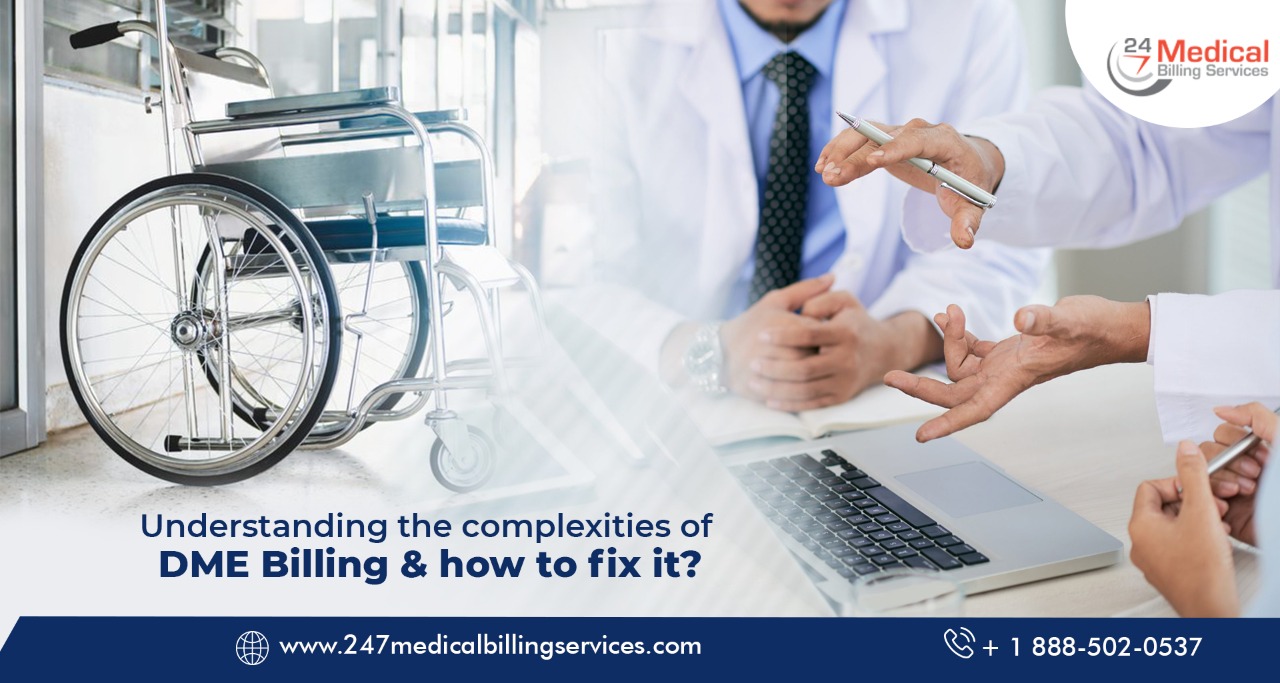
Understanding the Complexities of DME Billing & How to Fix it?
Millions of people in the United States rely on some form of durable medical equipment (DME) devices. DME is a necessity for them as they would not be able to move around, go about their daily routine activities, or get relief from their illness's symptoms without it. We need to understand the Complexities of DME Billing.
Undoubtedly, technology advancements have made purchasing DME far easier and more convenient. Patients can now obtain wheelchairs, continuous positive airway pressure (CPAP) machines, and other medical equipment without leaving their homes. The only need is to place their orders online or by phone, and the necessary equipment will be delivered right to their door.
But that isn't to say that obtaining DME is without complications. There are still some issues with obtaining DME. In fact, the DME billing process, as well as reimbursements, has become more complex than ever. The following challenges can trip up anyone in DME billing and place a heavy burden on suppliers.
Chasing providers’ office for DOCUMENTATION
The primary cog in the DME coding and collection wheel is documentation. Inadequate documentation and incorrect information lengthen the overall payment cycle. It is a concerted effort to obtain prescriptions and other medically required documents from the provider's office. This raises the cost of doing business while also lengthening the time it takes to deliver the products. Suppliers may even be required to postpone the shipment of supplies until all documentation is completed. Certain products necessitate more documentation, and the time spent chasing those leads suppliers to believe that it is better to remove those products from their list entirely for better business sense.
REIMBURSEMENT impact
Both commercial and Medicare payers have significantly reduced reimbursements. DME suppliers have no choice but to increase profitability through increased volumes. Even with enhanced volumes, the operational cost of document management mitigates the impact. DME medical billing service providers pay close attention to this factor and work hard to minimize any negative impact on reimbursements.
Regulatory changes, including increased scrutiny, tight credit markets, and the introduction of competitive bidding, have also had a significant impact on reimbursements, rendering DME businesses obsolete and obsolete. Companies are feeling the effects of losing bids and, as a result, patients and referral sources. Even if they win the bids, the reimbursement rate will be much lower than it was previously.
TRAILING in billing and handling DENIALS:
Billing on time is a challenge that suppliers face these days. Their company's cash flow is being hampered as a result of this. There is a way out to catch up by taking shortcuts, which does not help and adds to the complexities of DME Billing. The number of denials is increasing by the day. The majority of them are not aggressively pursued because companies face increased costs to collect rates. In some cases, at least non-electronic denials are not posted. This leads to additional issues, such as not knowing how to prevent them in the future. Without data for analytics, there is no visibility into how the business is performing!
Payer GUIDELINES issues
DME Suppliers frequently encounter payers who deny claims for the following reasons:
- Regarded as therapeutic services
- Unauthorized by Medicaid, Medicare, or a private health insurance plan
- Lack of strong foundation in the HCPCS, which represents level II codes assigned to DME equipment and supplies.
- Previously permitted reimbursement level
Physicians must ensure the medical necessity of their prescriptions when prescribing DMEs as a major requirement of clinical treatment. However, only medical necessity may not be sufficient; it is also critical to know upfront whether or not DME services are covered under the patient's plan.
Need of the hour to mitigate the above complexities of DME Billing:
DME Billing Process companies should concentrate on:
- Process reengineering results in cost optimization, which streamlines order-to-cash cycles.
- Cash efficacy.
- Transform and remodel processes and organizational structure to keep up with rapidly changing market trends.
- Using integrated technology and analytics to drive critical business outcomes.
How can outsourcing DME billing and coding help you with your issues?
Outsourcing DME billing and coding services to expert medical billing companies such as 24/7 Medical Billing Services can help you to focus on lowering the operational costs of your business. It can also ensure seamless billing transactions by providing up-to-date resources and experienced billers and coders. Ensuring timely claim submission and continuous follow-up, there is an operational extension that provides benefits such as robust reporting and a free dedicated revenue cycle management. Contact the expert DME billers and coders of 24/7 Medical Billing Services to assist your DME billing process with efficient revenue generation, allowing your business to focus on its core work.
Read more: How To Increase Profits For Your DME Store?

.png)